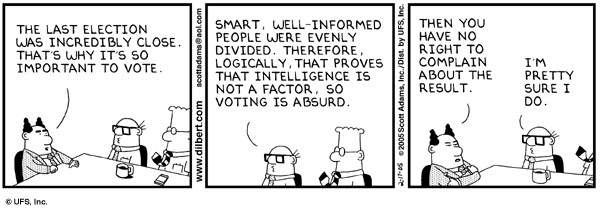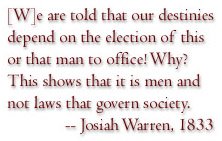If you're at all interested in what John Burley has to say on financial freedom or real estate investment, then you'll very quickly find your way to the John Burley Discussion Forums. I have spent a good deal of time reading the messages there, myself - originally because I was in thrall to the beliefs, but more recently as research for my Burley-related posts here (and I admit there's an element of sick fascination involved, as well).
One of the dangers of reading the forums for extended periods, however, is that you might find yourself starting to almost believe the hype. Message after message from "successful students" who claim to be living the dream and making fistfuls of cash (aka, "Progressive Profits") as a result of following Burley's advice is enough to weaken even my skepti-sense after a while. It takes a conscious effort to remember that
- Correlation does not necessarily mean causation (e.g., just because night follows day does not mean that day is the cause of night)
- Anecdotes are the weakest form of evidence for something (precisely because of reason 1, but also because they aren't necessarily representative of the target population as a whole)
- Most importantly: this is Burley's promotional site! You can find rah-rah sites on the web for just about any absurd scam you can think of - from homeopathic "medicine" to "over unity" technologies.
Let's have Robert introduce himself:
Hello, my name is Robert Yang.
I am the Host of yisemen.com, a site devoted to your financial education. I just turned 35 and currently in semi-retirement after achieving financial freedom for myself and my family. It did not start out this way. In October 2002, after realizing I lost $500,000 in the stock market with a high probability of been laid off from a Fortune 500 company that I worked for since college. I dedicated myself to the “1,000 days challenge” to be out of the rat race (achieve financial freedom). I was fortunate to have many mentors and found many supportive networks along the way. I have indeed achieved financial freedom in less than 3 years.
However, it was not an easy road traveled. Being a W2 wage earner with a full-time job and a family to take care of, it was hard to get started. I learned enough lessons along the way that I am now in a position to share my experiences with you and support you if you too have the burning desire to one day quit your job to spend more time with your family and having the free time to do what you like to do, not what you have to do. I honor you for taking your first giant step forward and joining me and my friends in the journey toward financial freedom! As one of my mentor Anthony Robbins likes to say, “Life will never be the same again!”
How did I came up with the name yisemen”? Last year, when I was interviewing CPAs for one of my companies, I was asked to give the names of our principles. I was providing the names one by one, she noticed that my partner, Jeffrey, my advisor, Edwin, and myself all shared the last name starting with the letter Y. So, she jokingly said, “you guys are the three Y’s men (wise men). I like the name a lot and decided to keep this nickname and be one of the – “yisemen”.
Keep the passion alive,
Robert Yang
Unfortunately some time in the past 3 months Robert's web site for Yisemen Financial has all but disappeared. All that remains today is Google's cache of the site.
One has to wonder what happened. Yisemen Financial had so much going for it! With the incomparable teachings of Robert Kiyosaki, Matthew Chan, and John Burley behind it, as well as the indispensable "burning desire" of Robert Yang - Burleyist extraordinaire - to succeed, it just doesn't seem possible that the company could have met with failure. Of course, the other possibility is that Robert has taken that fabled quantum leap out of the rat race and has no need of Yisemen Financial any more.
But wait! Robert says that he had already done that before starting his site, so that can't be the answer - and clearly the financial education needs to continue because, for example, I have yet to leave the rat race. So none of it makes any sense!
Whatever happened, though, I hope Robert Yang is "keepin' the passion alive" out there somewhere!
Google's cache of www.yisemen.com is undoubtedly going to be cleared soon, and I can't bear the thought that Robert Yang's invaluable insight might be lost. So, for the sake of posterity, here are a couple choice quotes (I really want to do more, but I'm a little worried about already being on the edge of fair use)...There are no bad investments
There are bad investors
This is so true. It is the investor, who finds a way to create value, and make it a good investment. I lost tons of money in the stock market because I was a bad investor prior to October 2002. I thought I was a great investor when I saw one of my high-tech stock portfolios grow from $20,000 to $240,000 between 1993 to 2000. Now looking back, I realized I was just a Level Three pig who got lucky with the tech run in the 90s. I had no limit order in place to sell my stocks when it fell below a certain price. I was greedy. I took everyone’s advice – invest for the long term. I didn’t cared how high the PE (Price to Earnings) ratio was – thinking there are more fools behind me who will pay even higher prices for my stocks. I did not realize that stock is not a secured investment, where the down side can be 100%. I had absolutely no control over my investment in the stock market.
Yet, not all investors lost money during the stock market crash of 2001. Warren Buffet did just fine for his investors. Many seasoned investors had hedge position. Some even welcome the big swing in the market as they utilize options to earn very high return on their money. So, the lesson is – It is not the investment, it is the investor that creates the return.
...
So, what is the secret for getting out of the rat race?
My experience tell me that first you have to address the basics. Once you have a good fundemental, you can speed the procoess up by going through self-improvement seminar, having mentor, network with other successful people.
1) You must save a part of you earn... It a sample mathemtics. When you get your check every month, put at least 10% to 20% aside for investing before you pay for everything else...
2) Know your financial freedom gap
Financial Freedom Gap = Expense - Passive Income
Track your expense for few months and know how much money you needed per month to live. Start invest for passive income. Most people only invest for capital gain (which help to increase your networth, but does nothing to get you the income you needed to be out of the rat race).
3) How much money do I need to retire?
It depends on what rate of return you can get.. Example if you need $5,000 per month to cover your expense, then,
APR Capital Needed
2% $3,000,000
8% $750,000
15% $400,000
4) Turn your liability (which creates expense) and un-productive assets (which generates no passive income) into true assets (that produces income for you every months).
5) Network with other sucessful investor and co-invest with them when you starting out.
6) Improve your skills by going to seminars, listen to audio CD, get a mentor if you want to speed up the process.
7) Play Cashflow 101 at least once a month for the next 12 months
Those are some of the fundmentals...
Keep the Passion Alive,
RobertY (Host)
Feeling financially freer, yet?





